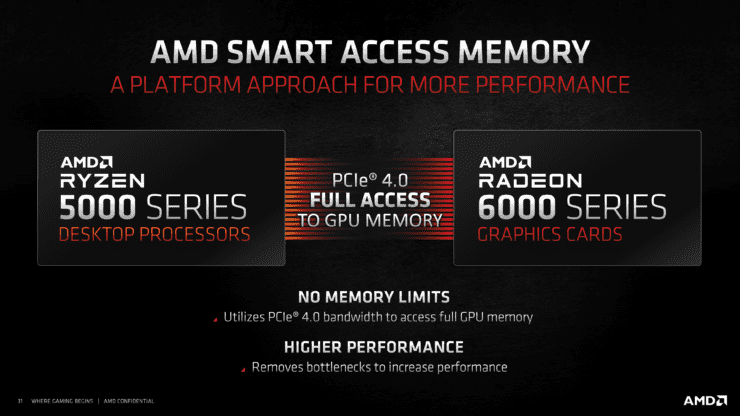
Several motherboard makers have started adding support for AMD’s Smart Access Memory tech on Radeon RX 6800 XT & RX 6800 graphics cards to the Intel-based 400-series motherboards. ASUS and MSI are the first to allow support for SAM with ASRock and Gigabyte quickly working on getting their own support out too. Japanese outlet, ASCII, has posted the first benchmarks of how well the feature performs on the Intel platform, showing a noticeable performance improvement.
AMD Smart Access Memory Tested & Benchmarked on Intel 400-Series (Z490) Motherboard With Radeon RX 6800 XT, Shows Up To 16% Gains In Performance
AMD’s Smart Access Memory technology which is a fancy name for BAR (Base Address Register) will not require users to invest in a PCIe Gen 4 platform as it will be supported by PCIe Gen 3 too. Based on what we know so far, BAR essentially defines how much discrete GPU memory space can be mapped and today’s PCs are typically limited to 256 MB of mapped memory. AMD claims that with SAM (Smart Access Memory), they can access all of the GPU memory, removing bottlenecks to allow for faster performance.
AMD officially only mentioned that SAM (Smart Access Memory) would be supported by its Ryzen 5000 CPUs and the respective 500-series chipset based motherboards. However, board makers not only enabled support on AMD’s 400-series motherboards but are also adding support to Intel’s 400 series motherboards such as the Z490 variant tested here.
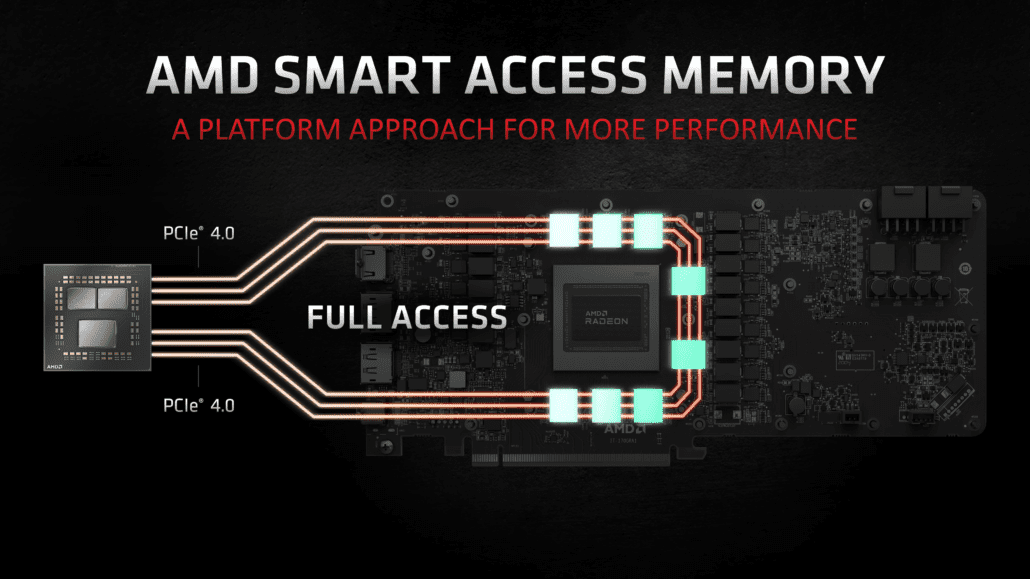
The platform used for testing included the ASUS ROG Maximus XII Extreme motherboard which was running the latest 1002 BIOS which adds support for AMD SAM (Smart Access Memory) on it. The Intel Core i9-10900K CPU was used along with the Radeon RX 6800 XT graphics card to see if the feature could be enabled and any performance gains can be seen on an Intel platform with the feature enabled. To enable the feature, you have to access the BIOS and navigate to the ‘Advanced’ page. The feature is set to Disabled by default but has to be set to Auto to get it to a working state.
After booting in the PC and opening the graphics card in the device manager, you can see that the GPU appears with a ‘Large Memory Range’ as indicated by its range address of ‘0000004000000000 to 00000043FFFFFFFF’.
AMD Smart Access Memory Performance Benchmarks With Intel Z490 & Radeon RX 6800 XT
Coming to the performance benchmarks, a total of four titles were tested which include Assassins Creed: Valhalla, Forza Horizon 4, Red Dead Redemption 2, and Rainbow Six Siege. First up, we have Assassin’s Creed Valhalla which was tested at 1080p resolution at the high quality preset. The GPU sees a 14% gain in average and a 13% gain in minimum (1%) FPS numbers which is a great start for the feature on an Intel platform.
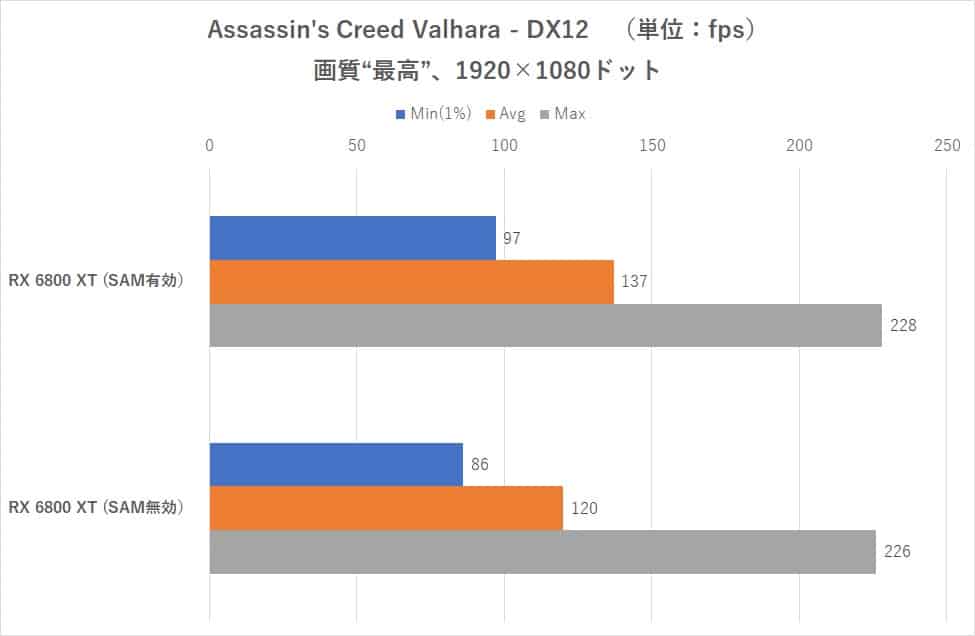
Moving on, we have Forza Horizon 4 which was tested at both 1440p and 1080p resolutions. Here at 1080p, the GPU sees a 19% average and a 20% gain in minimum FPS numbers. At 1440p, the RX 6800 XT gains fall down to 16% average and 17% minimum which indicates a CPU bottleneck at the lower resolution. As you increase the resolution, the CPU bottleneck is reduced and the GPU is the primary determinant of performance. With that said, 4K should also see a double-digit gain in GPU performance at 4K in Forza Horizon 4.
AMD’s Smart Access Memory intends to do just that by removing CPU overhead and offering higher-performance. Next up, we have Red Dead Redemption 2 which is one of the most demanding titles released to date by Rockstar. The title was tested at the highest preset at the 1080p resolution and ASCII saw gains of 8% on average but a huge 2.8X improvement in the minimum result. ASCII reports that they tested the title 3 times and saw the same improvement every time the test was run.
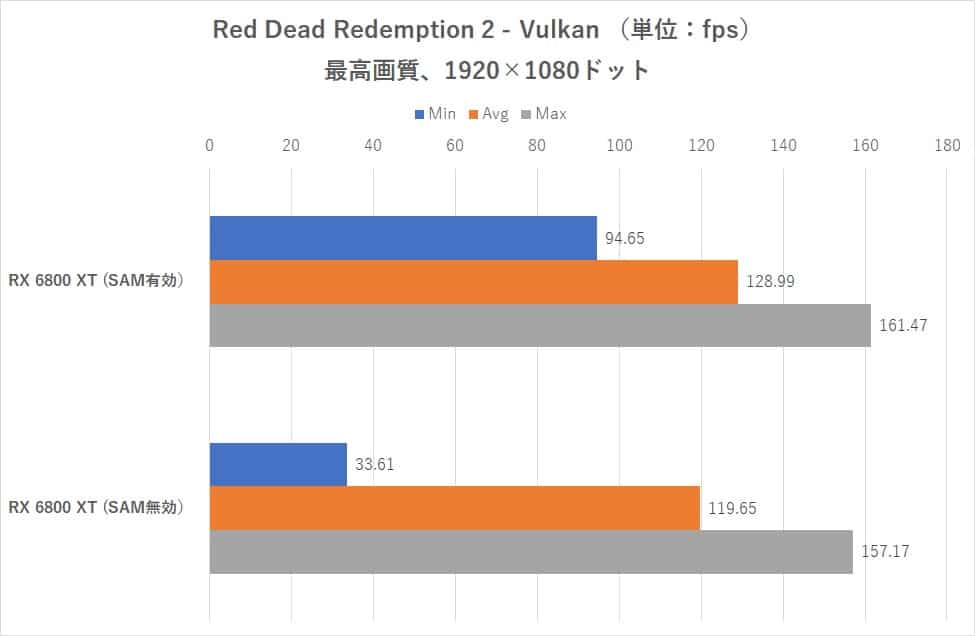
Lastly, we have Rainbow Six Siege which was tested at 1080p on the highest quality preset. The Intel platform saw a 1% gain on average but once again, a marked improvement in the minimum FPS of 12% compared to SAM turned off. While we don’t expect double-digit gains in all games, one thing is assured that Intel users would see smoother gameplay as a result of SAM since it boosts the minimum FPS figures, reducing the CPU overhead and allowing for faster FPS performance.
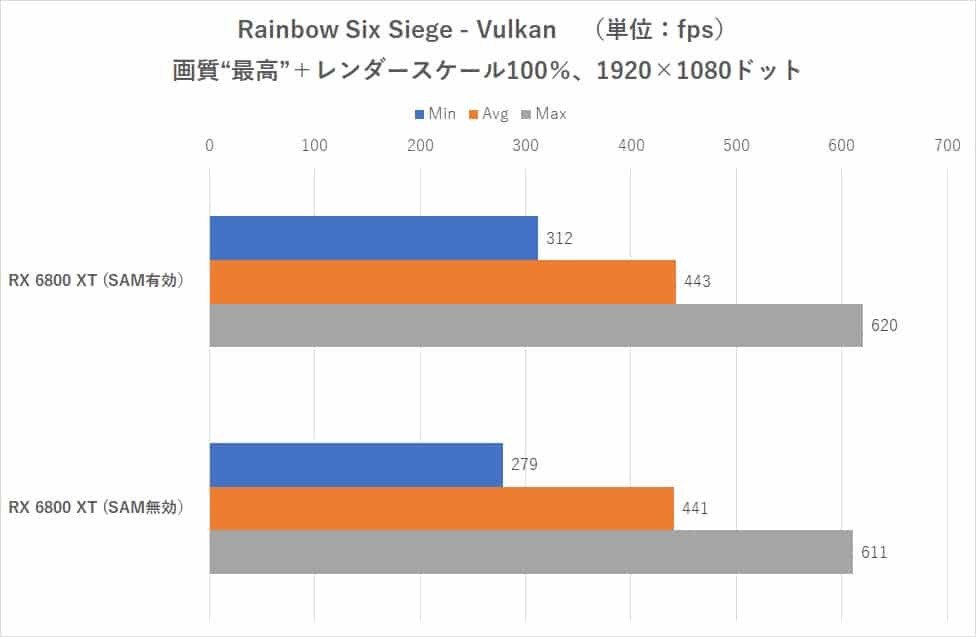
While we don’t expect double-digit gains in all games, one thing is assured that Intel users would see smoother gameplay as a result of SAM since it boosts the minimum FPS figures, reducing the CPU overhead and allowing for faster FPS performance. This free performance boost would be variable throughout the games and applications being tested but it’s definitely a huge deal considering a 10% jump is quite significant. NVIDIA is also working on its own BAR (Smart Access Memory) technology which will be supported across AMD and NVIDIA platforms. NVIDIA expects to release it later through a software update.
AMD Smart Access Memory Performance on Intel Z490 & RX 6800 XT (Via ASCII.JP)
| Game | Minimum SAM off | Minimum SAM on | Difference | Maximum SAM off | Maximum SAM on | Difference | Average SAM on | Average SAM off | Difference |
|---|---|---|---|---|---|---|---|---|---|
| Assassin’s Creed Valhalla (High) 1080p | 86 | 97 | 113% | 226 | 228 | 101% | 137 | 120 | 114% |
| Forza Horizon 4 (Ultra) 1080p | 209 | 252 | 121% | 316 | 367 | 116% | 221 | 220 | 100% |
| Forza Horizon 4 (Ultra) 1440p | 182 | 212 | 116% | 261 | 295 | 113% | 243 | 210 | 116% |
| Red Dead Redemption 2 (Highest) 1080p | 34 | 95 | 282% | 157 | 161 | 102% | 129 | 120 | 108% |
| Rainbox Six Siege (Highest) 1080p | 279 | 312 | 112% | 611 | 620 | 101% | 443 | 441 | 100% |
Update: ASRock has also enabled the AMD Smart Access Memory feature on its Z490 motherboard and calling it CAM (Clever Access Memory) within its Z490 motherboards. With a Core i7-10700K & Radeon RX 6800 XT running on the Z490 Taichi motherboard, gains of up to 12% were seen.
Board was running the latest BIOS which enables support for the feature allowing for higher performance as can be seen below:
MSI Confirms Its Own Smart Access Memory Support Coming To Intel Z490, H470 & B460 Motherboards
Meanwhile, MSI has announced in a press release that it is bringing a BIOS update to enable AMD Smart Access Memory support on its own 400-series motherboards. The initial plan is to support Z490 motherboards at the beginning of December so we can expect the BIOS updates to roll out within a few days. This would be followed by partial support for B460 and H410 motherboards & finally, we can expect a full list of B460 and H410 motherboards to be supported by the end of the month.
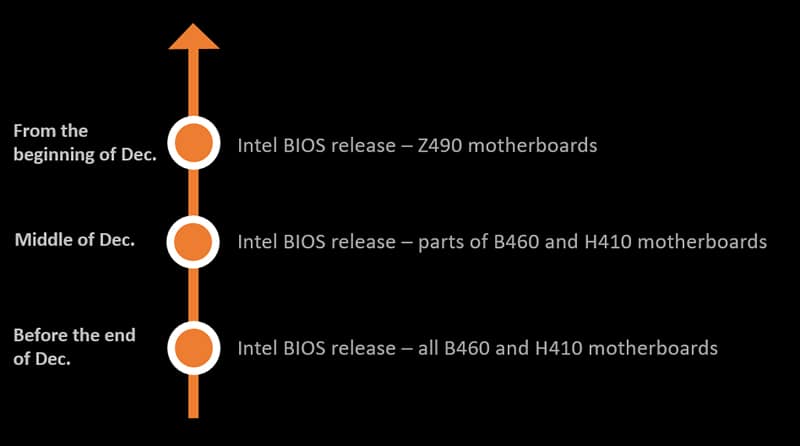
MSI showcased a running example of its Z490 GODLIKE motherboard allowing for the ‘Large Memory Range’ within the device hardware panel when running a Radeon RX 6800 graphics card.
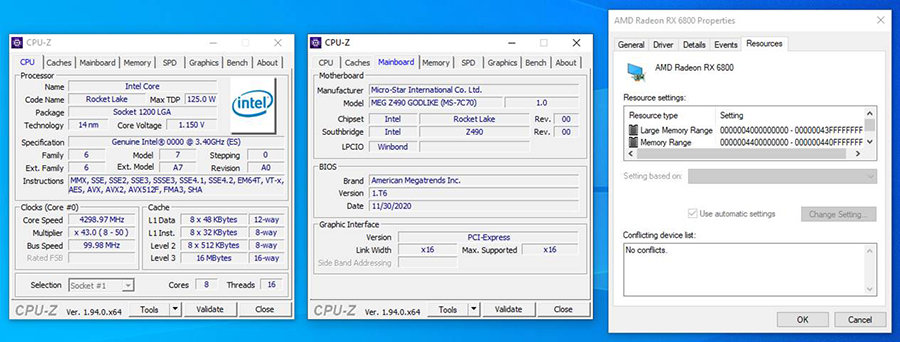
Unfortunately, MSI has to remove the press release since it also listed down the unreleased Intel Rocket Lake CPU, presumably the Core i9-11900K. The CPU was shown running at a base clock of 3.40 GHz and a boost clock of 4.3 GHz which definitely aren’t final clock speeds. Other specs such as 8 cores, 16 threads, 16 MB of L3 cache, and a TDP of 125W were also spotted.

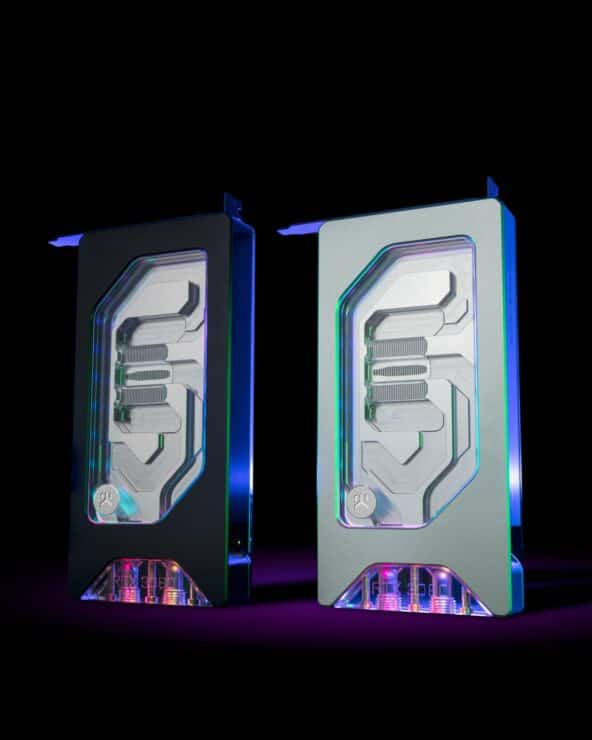


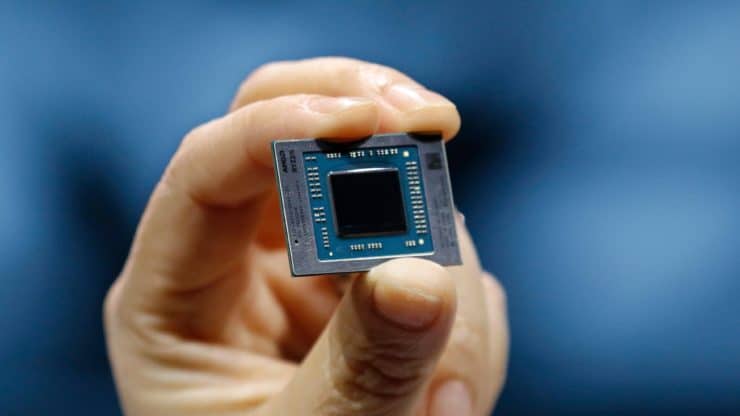
More Stories
EKWB Unveils The Quantum Vector FE RTX 3080 D-RGB – Special Edition Blocks For GeForce RTX 3080 FE Graphics Card
AMD Ryzen 7 5800H 8 Core & 16 Thread Cezanne ‘Zen 3’ High-Performance CPU Shows Up, Early ES Chip With 3.2 GHz Clocks
AMD Ryzen 9 5950X 16 Core Flagship CPU Benchmarked Again, Crushes Intel’s Top Core i9-10980XE 18 Core HEDT Chip